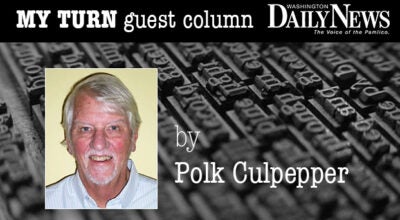An unwelcome ‘choice’
Published 6:09 pm Friday, April 12, 2019
The Washington Daily News article, “Kidwell Bills Could Bring Election Changes” that recently ran was about two N.C. House bills now before the state House: HB 481 and HB 294.
HB 481
HB 481 appears, in my opinion, to be a sensible bill. It would permit Beaufort County a choice to hold a referendum to continue or to disband the 30-something year-old federally mandated voting process that currently limits each Beaufort County voter to cast only a single vote from among all county commission candidates on the ballot. Rep. Kidwell notes that HB 481 will restore the voters’ options on how they elect their county commissioners. I agree with Rep. Kidwell that choice is almost always a good thing for voters.
HB 294
HB 294 proposes to restrict municipal choice. HB 294, if passed, would mandate partisan elections in every one of the 553 North Carolina municipalities. Since almost all of the state’s 553 municipalities now have adopted a nonpartisan election process, this bill would make for dramatic and unwelcome changes to literally hundreds of towns and/or cities.
How can I say “unwelcome” changes? Easy! Currently, municipalities have statutory authority (choice) to declare whether municipal elections will be partisan or nonpartisan. The elected officials can change the election process at any time. Since almost all the 553 towns and cities have chosen nonpartisan, we can assume a mandatory order to switch to nonpartisan would certainly be “unwelcomed.”
Local people and their town boards or city councils making choices among alternatives … is what the 553 municipalities have now. As they say, “If it ain’t broke, don’t fix it.” Fixing a nonexistent problem with a “one size fits all” solution is a bad idea.
The next obvious question to ask now is: Who would benefit from HB 294’s mandated partisan elections? For sure, we can assume it is not the great majority of North Carolina towns and cities. The obvious beneficiaries are the two major statewide political parties, Republican and Democratic. The reason? Partisan elections make for more competition, more hype and more money. With partisan elections mandated statewide, North Carolina party organizations will raise and spend more and more money on the politicized races.
Under HB 294, partisan elections will automatically require two parts: the first part will be the primary election, and a little later the second part, the general election, will be held. More parts to an election require more money.
Another obvious question: Who wins? Under HB 294, the major parties are the winners because they raise and spend the most money. They can more easily determine who will be selected in the primary elections with a modest investment of television, print ads, home-delivered “infomercials” and the use of social media and the Internet. HB 294 would allow the major statewide parties to more easily control elections. Conversely, non-major party candidates would be greatly disadvantaged by a two-step primary and general election process. Time, money and logistical inputs are easy for major party candidates; they are challenging hurdles for non-major party candidates.
Elections are also expensive for the municipalities. Were HB 294 to become state law, all towns would have to pay for the two-step election process: primary election first, then the general election second. With N.C. having a great majority of small towns, HB 294 would impact hundreds of town budgets.
Lastly, what municipal responsibilities are advanced by injecting partisan elections into the civic area? Are sewer, water and gas lines logical partisan issues? I think not. Are police protection, fire protection and EMS partisan issues? I don’t think so. How about administration, recreation and cemeteries? Again, no.
Choice exists now for every municipality to choose an election process for itself, partisan or nonpartisan. A small number of larger cities/towns do choose the partisan method of elections. The great majority of towns/cities choose nonpartisan elections.
Choice from our state legislature is a good thing. HB 294 does away with choice; it is unnecessary legislation.
I hope you will contact your N.C. representatives and senators to oppose HB 294 — Mandatory Partisan elections for all NC Municipalities.
Thomas B. Richter is the mayor of the town of Washington Park.



